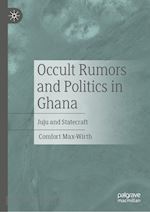
Questo prodotto usufruisce delle SPEDIZIONI GRATIS
selezionando l'opzione Corriere Veloce in fase di ordine.
Pagabile anche con Carta della cultura giovani e del merito, 18App Bonus Cultura e Carta del Docente
This book addresses the phenomenon of rumors about the occult in contemporary Ghanaian politics. Drawing on data from fieldwork interviews and analysis of case studies, it examines: why political rumors in Ghana often focus on the occult; what political-occult rumors accomplish and for whom; the ways in which Ghanaian politicians use rumors about the occult to gain political advantage; and some of the popular attitudes of the electorate to the rumors. The book demonstrates that political-occult rumors have become important tools in the hands of Ghanaian politicians to gain political advantage over opponents, and the electorate as means to critique the actions and behavior of political actors and the political process, generally. In a nutshell, this book highlights the important role of occult rumors in modern Ghanaian politics, with a particular focus on the period between the late 1970s and present. The main thrust of the argument in this book is that the flourishing of political-occult rumors and the strength of Pentecostalism are related, and that far from being a phenomenon existing on the margins of modern Ghanaian society, the occult is powerful, public and mainstream.
Chapter one: Introduction.- Ghana, Religion, and Politics.- The Occult in Postcolonial Africa.- Methodological Considerations.- Chapter Outline.- Chapter Two: History And Evolution Of The Occult In Ghana.- Introduction.- Indigenous Religion in Precolonial Ghana.- Colonial Formulation of the Occult.- Missionary Formulation of the Occult.- Pentecostal Formulation of the Occult.- Contemporary Perceptions about the Occult in Ghana.- Conclusions.- Chapter Three: The Socio-Political Significance Of Rumors In Ghana.- What is Rumor?.- Rumor, Religion, and the Occult.- Rumor and Politics.- Rumors as “Weapons of the Weak”.- Conclusions.- Chapter Four: The Socio-Political Significance Of Rumors In Ghana.- Versatility of the Occult as a Spiritual Resource.- Negative Pentecostal Narrative on the Occult.- Claims Made by Occult Ritual Specialists.- “Strange” Happenings.- Conclusions.- Chapter Five: Cynicism Towards Political-Occult Rumors.- Cynicism Towards Politics in General.- Occult Rumors and the Media.- Political Alignment.- Politicians’ Public Image.- Conclusions.- Chapter Six: Political Utilization Of The Occult: Avoiding The Occult.- Associating with Pentecostals.- Moral and Spiritual Backwardness of the Occult.- Deflecting Responsibility and Avoiding Criticism.- Conclusions.- Chapter Seven: Political Utilization Of The Occult: Embracing The Occult.- Embracing Positive Characteristics of the Occult.- Embracing the Occult for Political Advantage.- Conclusions.- Chapter Eight: Conclusion.
Comfort Max-Wirth is a lecturer in the Department for the Study of Religions at the University of Ghana, Legon.











Il sito utilizza cookie ed altri strumenti di tracciamento che raccolgono informazioni dal dispositivo dell’utente. Oltre ai cookie tecnici ed analitici aggregati, strettamente necessari per il funzionamento di questo sito web, previo consenso dell’utente possono essere installati cookie di profilazione e marketing e cookie dei social media. Cliccando su “Accetto tutti i cookie” saranno attivate tutte le categorie di cookie. Per accettare solo deterninate categorie di cookie, cliccare invece su “Impostazioni cookie”. Chiudendo il banner o continuando a navigare saranno installati solo cookie tecnici. Per maggiori dettagli, consultare la Cookie Policy.